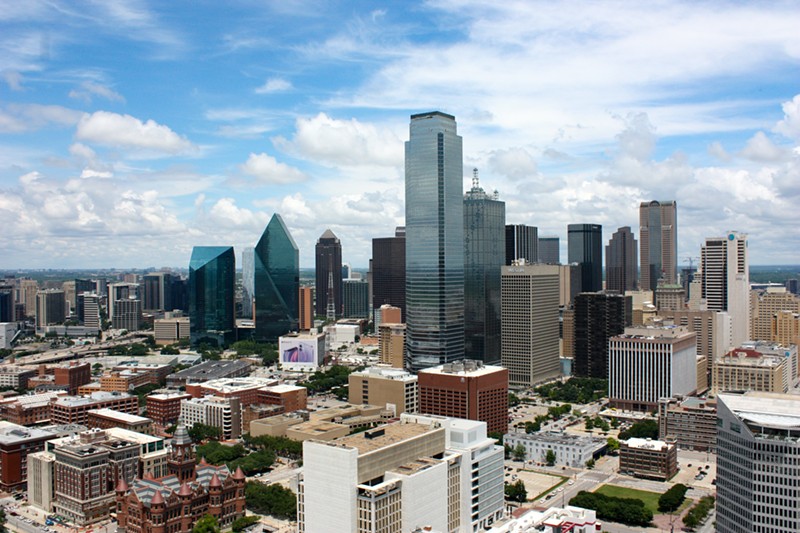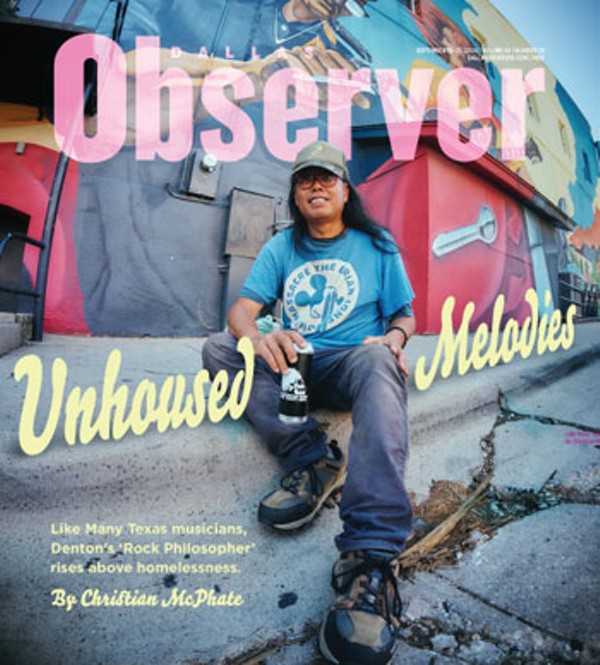With higher demand than supply, housing in Dallas has lately come at a premium, so local developers recently purchased largely empty office buildings with plans to convert them into downtown apartments.
These new apartments will likely cater to luxury clientele.
Todd Interests spent $460 million in updating the First National Bank tower on Elm Street, converting the property into The National apartments, the Thompson Hotel and other office and retail spaces.
The cost for a one-bedroom, one-bathroom, 660-square-foot apartment at The National residences is $2,495 per month. A 1,157-square-foot one-bedroom, one-bath costs $4,040-4,080 per month. Rent for a 3,064-square-foot penthouse is almost $20,000. But even with some of the highest rents in the city, Philip Todd, a partner at Todd Interests, said that it's almost fully leased up.
Todd Interests has also purchased Energy Plaza on Bryan Street, and according to The Dallas Morning News, is spending more than $300 million to turn it into apartments and luxury offices.
Philip Todd said he is excited about the project at 1601 Bryan St., formerly called Energy Plaza, and emphasized the importance of preserving the building's history. It was built by Pritzker award-winning architect I.M. Pei, who designed five buildings in Dallas, including City Hall.
"It's a pretty amazing design," Todd said. "We're adding 293 luxury residences, and then we're adding about 450,000 square feet of office space, and then we're taking the whole front plaza and doing an over-the-top garden space that has a restaurant component as well as the lobbies and a motor court. That's pretty awesome."
Todd said that while the renovations at 1601 Bryan are not using tax-increment financing (TIF) money from the city, which requires a certain number of affordable units, the previous renovations they did at The National did. In order to comply with the TIF regulations, Todd said they have 30-plus units available to people who meet the requirement of earning no more than 80% of the average median income for the area.
The TIF program is supposed to incentivize the creation of affordable housing, but it's fallen short of that goal in the past.
Dallas-based investment firm Woods Capital has also acquired buildings downtown, including Bryan Tower and Santander Tower, with the intention of creating new apartments.
“You get a massive correction in terms of the office supply, and you get close to 2,500 new residential units,” founder of Woods Capital Jonas Woods told The Dallas Morning News. “That will bring a massive increase in daytime, weekend and nighttime population downtown … [which] will support the restaurants, the amenities, the service retail — all the great things that make a great urban neighborhood.”
But while new luxury apartments might bring some life to downtown Dallas, for many people housing is still not affordable.
Housing is in short supply in Dallas these days, and Sandy Rollins, the executive director of the Texas Tenants Union, said that Dallas especially needs more affordable housing as the gap between the lower income and higher income residents continues to grow. “The cost of housing [is] more and more out of reach,” Rollins said. “The affordable units are disappearing.
“Converting an office building is not as big a concern as if they were taking an existing housing building … occupied by people paying lower rent and renovating it and jacking up the cost,” Rollins explained. “It’d be nice if they shifted their focus a tad, [but] it doesn’t sound like they’re harming anybody directly, and even if they’re not, you know, it’d be nice if they would help.”
Todd agreed that there is a need in Dallas for housing for people of all income levels but said that across the country, Dallas is still relatively affordable compared with other cities, which is partly why people are moving here.
"I do think Dallas as a whole is still a lot more affordable than a lot of other cities of our size, which is great," he said. "When you're moving here from New York or California, or even people now moving from Miami because it's gotten so expensive, they view some of the residences here as a great value to them. So, I think that's a positive that Dallas has for it."

Audio By Carbonatix
[
{
"name": "Air - MediumRectangle - Inline Content - Mobile Display Size",
"component": "18855504",
"insertPoint": "2",
"requiredCountToDisplay": "2",
"watchElement": ".fdn-content-body",
"astAdList": [
{
"adType": "rectangle",
"displayTargets": "mobile"
}
]
},{
"name": "Editor Picks",
"component": "17105533",
"insertPoint": "4",
"requiredCountToDisplay": "1",
"watchElement": ".fdn-content-body",
"astAdList": [
{
"adType": "rectangle",
"displayTargets": "desktop|tablet"
},{
"adType": "rectangle",
"displayTargets": "desktop|tablet|mobile"
}
]
},{
"name": "Inline Links",
"component": "18349797",
"insertPoint": "8th",
"startingPoint": 8,
"requiredCountToDisplay": "7",
"maxInsertions": 25
},{
"name": "Air - MediumRectangle - Combo - Inline Content",
"component": "17105532",
"insertPoint": "8th",
"startingPoint": 8,
"requiredCountToDisplay": "7",
"maxInsertions": 25,
"watchElement": ".fdn-content-body",
"astAdList": [
{
"adType": "rectangle",
"displayTargets": "desktop|tablet"
},{
"adType": "rectangle",
"displayTargets": "desktop|tablet|mobile"
}
]
},{
"name": "Inline Links",
"component": "18349797",
"insertPoint": "8th",
"startingPoint": 12,
"requiredCountToDisplay": "11",
"maxInsertions": 25
},{
"name": "Air - Leaderboard Tower - Combo - Inline Content",
"component": "17105535",
"insertPoint": "8th",
"startingPoint": 12,
"requiredCountToDisplay": "11",
"maxInsertions": 25,
"watchElement": ".fdn-content-body",
"astAdList": [
{
"adType": "leaderboardInlineContent",
"displayTargets": "desktop|tablet"
},{
"adType": "tower",
"displayTargets": "mobile"
}
]
}
]












